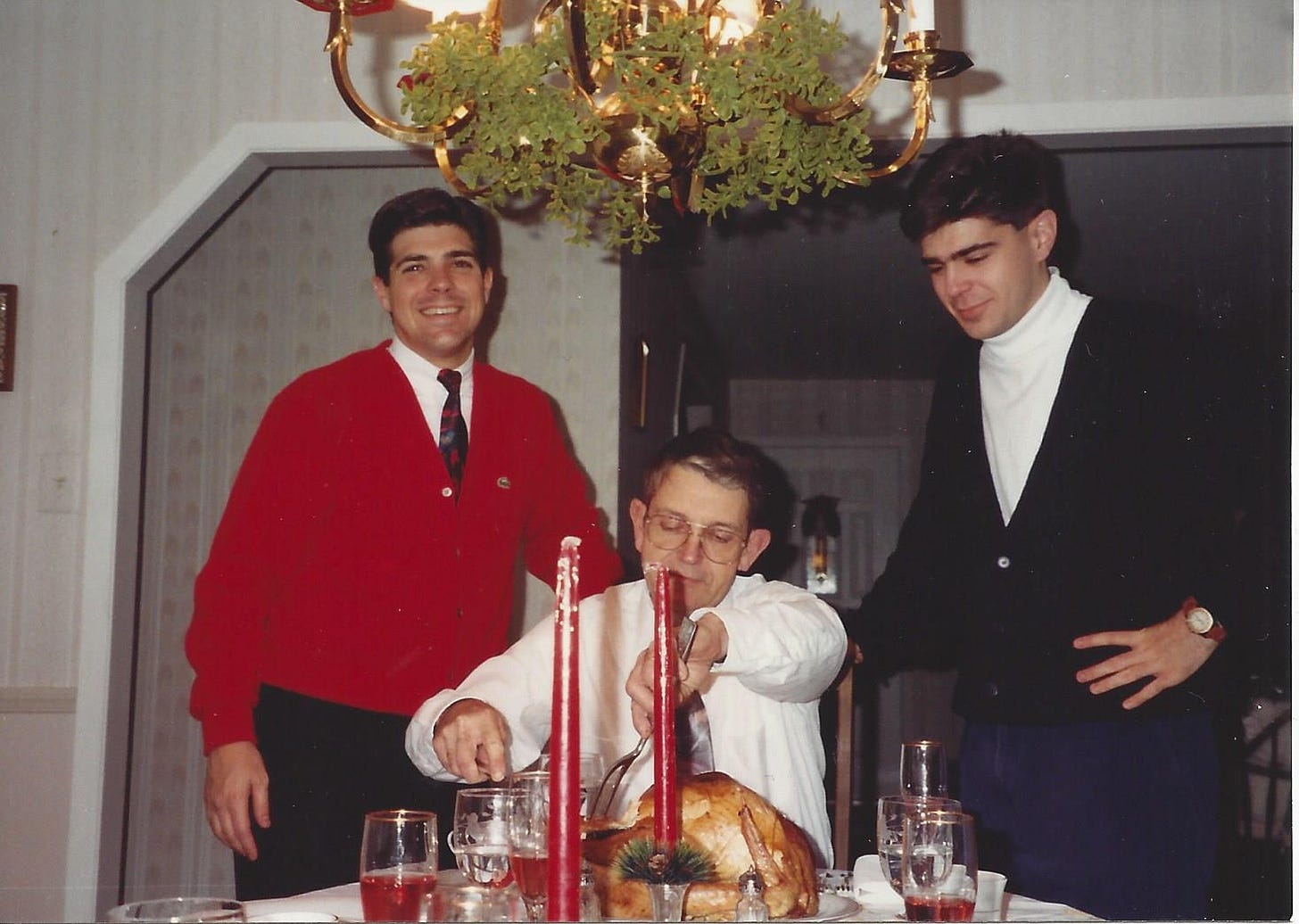Can you split the holidays without dividing your family?
Keeping the peace without sacrificing your sanity

For years, a nagging, low-key dread surfaced every October because I knew I would soon have to deal with an annual dilemma — whose family were we going to spend the holidays with?
It turns out, I’m not alone. One survey found that two out of five Americans say being in a relationship makes the holidays more complicated, and one in three dread planning how to split time with extended family.
That same survey also revealed:
24% say holiday plans cause tension between them and their partner
33% say holiday plans cause tension with their families
23% say they feel guilty or pressured by their family or their partner’s family about holiday plans
Achieving holiday harmony is complicated. When I think back on how my husband and I handled the dilemma of splitting the holidays, I realize we evolved through several approaches, each with its pros and cons.
Go your own way
The first year I was dating my eventual husband, it was simple — we followed the “you spend it with your family, and I’ll spend it with mine” plan.
While this approach is attractive because nobody has to make sacrifices or hard decisions, it’s not a viable strategy for the long term. Sooner or later, you’ll want to spend the holidays alongside your significant other, so you’ll have to adopt another plan.
Double the meals, double the fun?
By the second time the holiday juggernaut rolled around, it was clear that we were in a relationship for the long haul. We decided we wanted to appear in tandem at holiday gatherings.
Since both families lived in the same metro, choosing one family over the other wasn’t necessary. We appeared at one Thanksgiving gathering early in the day, and then showed up at the other family gathering in the evening. We followed a similar strategy at Christmas.
It wasn’t a bad arrangement in that we spent the entire holiday together, while scoring valuable “isn’t that nice that his/her significant other spent time with our family” points.
The adrenaline of pleasing everyone fueled us for a few years. Nobody was deprived of our presence. We didn’t have to choose one family over the other.
But inevitably, we spent a lot of time in the car. The year we were engaged, my fiancé told me that once we were married, he no longer wanted to be party to any plans that involved him eating two holiday meals in a single day.
One big happy family
Bringing our two families of origin together in the same place has its appeal because then you don’t have to choose one family over the other. The first Thanksgiving we were married, we volunteered to host the meal at our new house and invited both families.
This approach put most of the people we loved in one place, but it wasn’t perfect. My grandmom was there, but my uncle wasn’t because my aunt was hosting her family like she usually did for Thanksgiving.
And while my husband’s family and my family got along, it wasn’t quite as comfortable as it was when each clan gathered separately. Plus I didn’t want to sign up to be the host of every holiday gathering going forward.
The Rotation
That first year we were married, we spent Christmas Day with my family and spent New Year’s Day with my husband’s family. This balanced approach landed us at each family’s dinner table during the holiday week.
And since Christmas and its gift-exchanging made it a more significant holiday, we spent Christmas Eve with my husband’s family.
This rotational approach proved to be a solid one for us for many years, until a new relative arrived on the scene and upended it all.

The Blend
Our first child was born just before Halloween. Given that our daughter was the first grandchild for both families, everybody was a little excited that year, kind of like it must have been in Bethlehem lo those many years ago when that other special baby arrived. We invited both sets of grandparents to come to our house for dinner because we thought it would be far better than having to choose which family got to share the golden child’s first Christmas.
My parents arrived first that day bearing an adorable gift — a pint-sized rocking chair with a big red bow on it. Though it would be months before little Cassie could sit in it, it was a beautiful gift.
Minutes later, I looked out the window to see my in-laws on their way up the walk, also coming to pay homage to the child bearing their gift — a miniature rocking chair. Talk about awkward. I guess it was easier for the Three Wise Men because they must have worked out who was bringing what in advance.
Though everybody made the best of it, we learned a huge holiday-splitting lesson that day — sometimes it is better to let each side of the family have their own time and space with the grandchildren. So we came up with a new plan: The Blend.
Certain occasions like birthdays and First Communions and other once-in-a-lifetime events would by necessity call for both sides of the family to gather together. But routine occasions like Thanksgiving, Christmas, and other holidays might be more enjoyable for everybody if each family had their own time. So we’d rotate who we’d see for those.
Rather than settling into a habit of always spending Christmas Day with a particular side of the family, we alternated who got Christmas (my family in even years; his family in odd years). We’d spend Thanksgiving with the family we weren’t seeing on Christmas Day. And we’d typically see that side of the family on Christmas Eve too.
This plan worked well until some of our daughters moved out of town. When they came home for Thanksgiving, it made sense to offer equal access to all grandparents, so we shifted back to hosting everyone at our house.
This highlights one of the secrets to successfully splitting the holidays — being willing to adapt your plan as circumstances change.

Sanity-Preserving Principles for Splitting the Holidays
In some ways, we’ve had it easier than some other couples do when it comes to figuring out how to split the holidays. With both of our families in the same metro, travel hasn’t factored into the equation. And neither my husband nor I have a step-parent.
Nonetheless, most years still involved some degree of holding your breath until holiday plans were satisfactorily settled.
Here are some key takeaways about holiday diplomacy that might help as you make your own holiday plans:
Once you have made a commitment to one another as a couple, your primary duty is to one another
This doesn’t mean that you don’t care about your family or your partner’s family. It just means that your relationship takes priority. Your guiding principle should be to come up with holiday plans that are as pleasing as possible to the two of you. This will typically involve some compromise on both your parts -– no guarantees that you both will have everything exactly as you like it. But you should prioritize making choices that honor what you as a couple want.
Unless your partner doesn’t have a family, you should be willing to let go of the idea that you will still spend every holiday with your family
At first, it may be hard to not spend Christmas or Thanksgiving or Hanukkah with your family, but that’s just what happens. Hopefully your parents modeled the idea of sharing holiday time with both of their families of origin when you were growing up so you have seen how this works. If they didn’t, perhaps you have a friend or two who can provide examples.
Accept that it’s difficult to gather everyone you love in one place at one time on a holiday
After all, it’s not just you – your sister-in-law may want to gather with her family; your aunt and uncle may be used to hosting a holiday gathering that brings all of their family together. So many iterations of relatives can be involved that you simply can’t gather with everyone you want to see because of the relatives they want to see.
Try as hard as you can not to be bullied by other family members into celebrating the holidays according to their plan
This principle is especially important in the early years of your relationship. Most couples have at least one relative who would like to tip the holiday scales in their favor, and who may try to use any means at their disposal — guilt, reasoned arguments, alliances with other relatives, etc. – to get you to do things their way. Remember: your first priority is to come up with a holiday schedule that you as a couple are satisfied with. As long as you are treating both families equitably and they are receiving a “share” of you, you have nothing to apologize for or feel guilty about.
Start as you mean to go on
It may be tempting to postpone a reckoning — to try to please everyone now and rationalize that you’ll make a stand later, once you’re married, once you have kids, etc. But chances are that it won’t get easier. If you have a relative who is inclined to try to have things their way, there’s a better chance that any schedule that you get forced into now will only become more ingrained. Better to establish your boundaries early.
Once your relatives see that they are getting a fair portion of you during the holidays, there’s a chance that they’ll relax
I suspect that some parents during the early days of their offspring’s coupledom think that they need to “claim their share” now because they fear being left out in the cold or believe they’ll get a lesser share if they don’t speak up. Once you demonstrate that you are willing to give each family their due time for the holidays, they might lighten up.
If you and your relatives aren’t hung up on celebrating a holiday on its actual day, you all stand a chance of having a jolly holiday
As your siblings start to marry and the number of in-laws begin to multiply, it will become even harder to gather everyone together. You may stand a better chance of getting everyone together to celebrate Christmas on the Sunday before or after December 25. If you don’t let the calendar hold you hostage, your celebrations are more likely to have everyone present and happy.
Good luck! Remember, it may all turn out better than you think it’s going to. And even if it doesn’t this year, next year may be better.



Oh my, Joanne! What an important topic and SUCH a complicated one! Dominic and I had so many"arguments", especially considering that we lived in California, then Nevada, and all the relatives lived on the other side of the country. Buffalo NY to be exact, and Toronto Canada.
The only thing I have to offer this conversation is to be mindful of couples WITHOUT children, as there is always a burden put on them to be the ones to do the traveling, and a slight minimizing of the importance of their need to be in their own home for the holiday, even without kids. I can't tell you how many years it was always up to us to pay for expensive plane tickets and plan exhausting travel to get to the "family" far away. Just my two cents' worth.